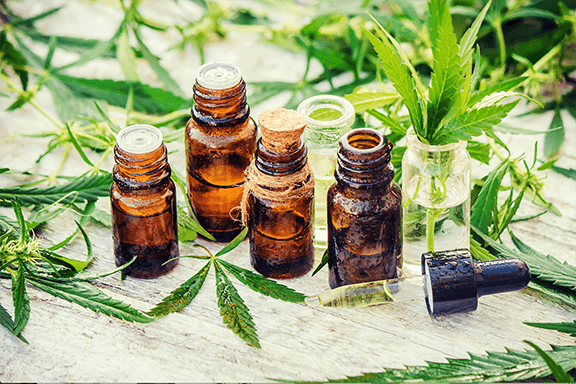CBD Education
Comparing Carrier Oils for CBD Tinctures
Whether you’re new to the world of CBD or have been using and advocating for CBD for years, you’ve probably heard the word ‘tincture’ a time or two. Tinctures are CBD extracts sold in oil form that are administered sublingually (under your tongue).
If you’ve decided that you want to try tinctures, there are a few variables to consider before spending your money. Flavor and the concentration of CBD in the oil are two elements to consider, but your overall experience (and the efficacy of the tincture) can be affected by the carrier oil that accounts for most of what’s in the bottle.
What’s The Purpose of a Carrier Oil?
When we say ‘carrier oil,’ we’re referring to the oil that acts as a vessel to deliver CBD extract to your body and bloodstream in an efficient manner. CBD extract typically comes in a crystalline form that is not easily absorbed by the body and would be difficult to measure for dosage information. Since CBD is fat soluble by nature, using a fatty plant-derived base oil to “carry” it helps increase the bioavailability and deliver more cannabinoids to your system.
How Many Different Carrier Oils Are There?
Any fatty, food-grade oil can be used in cannabis tinctures for sublingual use, though they aren’t all created equal. Since shelf life and taste are highly important factors, you’ll likely see one of only a few sitting on the shelves of your local apothecary. MCT oil, hemp seed oil, olive oil, and grapeseed oil are most common in the marketplace today, so we’ll dive a bit deeper into what sets them apart from one another.
The Most Common Carrier Oils
MCT (Medium Chain Triglyceride) Oil
Usually comes from fractionated coconut oil, palm oil, or a blend of the two and is popular because of its flavorless and odorless characteristics.
- Pros include high bioavailability (due to saturated fat content) as well as scientific evidence showing a list of benefits including its ability to boost energy, promote weight loss, and lower cholesterol.
- Cons vary depending on how the MCT oil is sourced. Palm oil is considered highly unsustainable due to the deforestation involved in its production, so it’s recommended to find a product that lists “fractionated coconut oil” or “coconut-derived MCT oil” on the label.
Hemp Seed Oil
As the name implies, hemp seed oil is made from the seeds of the hemp plant. Hemp seed oil contains little-to-no cannabinoids, so be careful not to confuse it with CBD or hemp extract that do offer those CBD benefits.
- Pros are the sustainability of the source crop itself and the nutritional content of the oil, which offers all nine essential fatty acids with the ideal ratio of 4:1 omega-6 to omega-3.
- Cons include an earthy, more noticeable flavor compared to other oils, as well as a lower saturated fat content (about 11%), meaning it doesn’t boost the bioavailability of CBD extract very much.
Grapeseed Oil
This oil comes from the seeds of—you guessed it—grapes. It has a subtle fruity flavor and is generally a bit thinner (lighter) than the other carrier oils.
- Pros include antioxidant and anti-inflammatory properties, plus high vitamin E and omega-6 content.
- Cons include a lower solvency and solubility compared to other carrier oils, due to its polyunsaturated fat content.
Olive Oil (Extra Virgin Olive Oil)
The household staple that is popular in meditteranean-inspired diets and meals.
- Pros are the many health benefits associated with EVOO and high levels of antioxidants, vitamins, and minerals.
- Cons are the high monounsaturated fat content, which makes anything carried by it a bit more difficult to process within the body. Plus, the relatively strong flavor and odor can be undesirable to some.
Which Carrier Oil is Best?
As you can see from the comparisons above, there really isn’t one oil that can be considered the runaway favorite. Everyone has their own preferences and dietary sensitivities, which is something we consider when helping our customers select an option from our sublingual tincture lineup. Due in large part to the high bioavailability it offers, coconut-derived MCT oil is arguably the most common carrier oil for CBD extracts, so it’s worth exploring as you research which product fits your lifestyle best.
Consumers should be aware that some hemp oils and hemp powders sold in supermarkets are made mostly from hemp seeds and should be expected to have little or no CBD oil contained in the product. So, products labeled as hemp oil or hemp seed oil should be assumed to contain no CBD whatsoever unless the label specifically states that it does.
We know this is a lot of information, so if you’re still in need of some clarity, we would love to hear from you. Visit the Kaya Hemp Co store in Phoenix or contact us online or by phone and a member of our team will be happy to answer any questions you may have about tinctures or any other CBD products.

